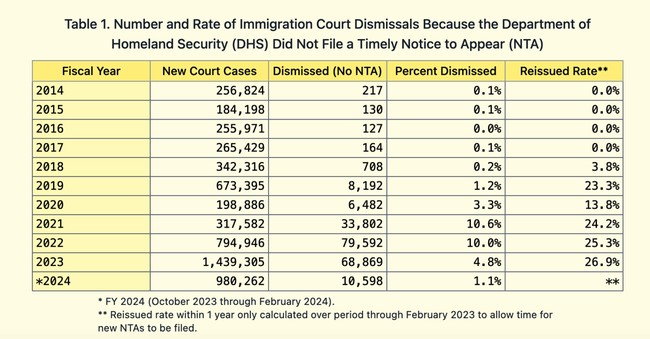Paperwork. It's a headache on good days, the bane of one's existence on bad. But "i's" must be dotted and "t's" crossed — particularly when it comes to court systems.
It seems, however, that the Department of Homeland Security (DHS) has dropped the ball in recent years when it comes to i-dotting and t-crossing. And as a result, some 200,000 immigration court cases have been dismissed due to an administrative snarl. Granted, 200,000 is a drop in the bucket when you're talking about millions of illegal crossings, but that's still a pretty big drop.
Here's what happened, according to a new report from the Transactional Records Access Clearinghouse (TRAC), which bills itself as "your source for comprehensive, independent and nonpartisan information about federal enforcement, staffing and spending":
Approximately 200,000 deportation cases have been thrown out by Immigration Judges since the start of the Biden administration because the Department of Homeland Security (DHS) hadn’t filed the required Notice to Appear (NTA) with the Court by the time of the scheduled hearing. Without a proper filing, the Court lacks jurisdiction to hear the case and the immigrants, often asylum seekers, lack a way to move their case forward.
How on earth is this possible? The report lays it out in detail, but to sum up, the DHS must file a Notice to Appear (NTA) to initiate a case with the immigration court, listing the reasons it believes an individual should be deported. For the immigration judge to have the requisite jurisdiction, DHS must file the NTA with the court. But here's where things get hung up:
Ten years ago, DHS’s failure to file an NTA before the scheduled first hearing was rare.[2] However, the frequency increased once Border Patrol agents and other DHS personnel were given access to the Immigration Court’s Interactive Scheduling System (ISS). Using ISS, agents can directly schedule this initial hearing (i.e., a master calendar hearing) at the Immigration Court at the time of issuing an NTA (even though this is before the NTA is filed) rather than waiting for the Court to schedule a hearing.[3] For NTAs issued at the border, the NTA is generally created at the same time that the hearing is scheduled and a copy of the NTA is given to the asylum seeker or other noncitizen with the scheduled hearing date, time, and location listed on the NTA.
DHS’s relatively recent access to the Court’s scheduling system created a new administrative problem: DHS employees could schedule Immigration Court hearings sooner than the agency could file the NTA, and this could have negative consequences for both the Immigration Court and the immigrant respondents themselves. Indeed, this is what happened. DHS has been able to block off the Court’s valuable limited time by scheduling hearings for cases that do not legally exist, because DHS has not filed the required NTA before the hearing. With Immigration Judges staring down 3.5 million pending immigration cases, every wasted hearing is a hearing that could have moved another case forward or resolved it.
Basically, Border Patrol agents now have the ability to issue a Notice to Appear (think of it as a ticket) with the court date at the time of the encounter, but then there's a delay between that and DHS formally filing the paperwork to get the case opened in the court system. And then what happens?
Additionally, immigrants, usually asylum seekers these days, who then show up to scheduled hearings only to find out they have no case after all are left without any means of making an asylum claim. To actually move forward and gain a Court hearing on their asylum claim, immigrants need to have a case before the Immigration Court. Also, until a formal asylum petition is filed, asylum seekers cannot generally obtain work permits. These dismissals therefore potentially extend the time and difficulties that individuals, and their families, face in securing food, shelter and other essentials while waiting for a work permit. Indeed, the lack of clarity about their case may only add to their sense of legal limbo rather than alleviate it.
In other words, it's a paperwork snafu that's making an already messed up system even more messed up.
Now, this problem didn't start under the Biden administration. The report contains data regarding cases dismissed due to the NTA not being on file back to 2014.

Couple things to notice about what this table shows: First, prior to 2018, the number of cases dismissed due to no NTA being filed was minimal — 100-200 per year. There's a jump in 2018, up above 700. It is unclear when agents were given access to the ISS, but clearly, something changed in 2018-2019, as we then see a significant jump in 2019 and 2020 (to 8,192 and 6,482, respectively).
But then, hold onto your hats. Because in 2021, that number jumped to 33,802, peaked at 79,592 in 2022, and clocked in at 68,869 in 2023. As a percentage of cases filed, dismissals due to unfiled NTAs jumped from three percent in 2020 to over 10 percent in 2021.
Keep in mind: That's cases dismissed simply because the NTA wasn't timely filed with the court — i.e., purely due to a paperwork screw-up. Now, I can see taking a beat to work out the kinks of a new system, but the disconnect between NTAs issued and filed had to have become noticeable sometime late in the Trump administration and absolutely clear-cut by a year into the Biden administration. Are we to believe that no one has been able to find a workable solution to speed up the DHS filing of NTAs? Or do they just not care?
The other thing that really jumps out from that table is the number of new immigration court cases, particularly from 2021 on. In fairness, there was a significant uptick in 2019, too. Still, the conclusion that the current administration's policies are overwhelming the system is inescapable. Having "the adults back in charge" means little if they're unable or unwilling to address even basic administrative issues.

